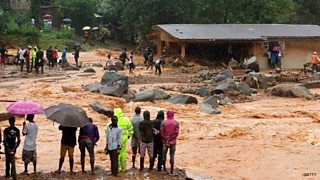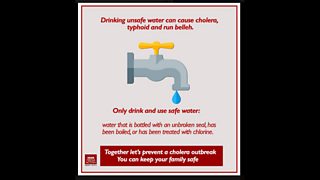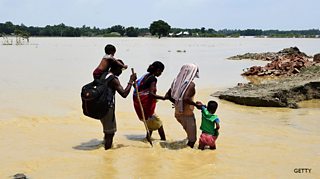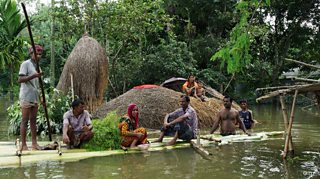Communication is aid: BBC Media Action response to floods in Sierra Leone, Nepal, Bangladesh and India
Nick Henegan
Senior Communications Manager, BBC Media Action
In the aftermath of a disaster information is as important as food, water and shelter. It can save lives. This week BBC Media Action teams from West Africa to South Asia have been delivering vital, life-saving information to people affected by a series of devastating floods.

Bystanders look on as floodwaters rage past a damaged building in an area of Freetown on August 14, 2017, after landslides struck the capital of Sierra Leone.
In Sierra Leone, where mudslides and floods have killed almost 400 and hundreds are still missing our team has been using their Facebook page, the most popular in the country, to provide information on how to access emergency numbers and centres where those affected can access food, clothing and other assistance.
We are also using Facebook to share advice on how people can keep their families safe by avoiding water contaminated by the flooding and prevent an outbreak of cholera or typhoid. And we’ve produced radio public service announcements on flood preparedness and cholera prevention as part of the Sierra Leone government’s communications response to the disaster that will be broadcast over the weekend.

Incessant monsoon rain has also caused widespread and deadly flooding in Nepal, Bangladesh and India which has left around 500 people dead and affected millions more.
Our team in Nepal has been working with BBC Nepali Service, national broadcaster Radio Nepal and other radio stations to address the urgent information needs of affected communities. Researchers have been contacting people in flood-affected areas using Facebook, email and phone to understand their priority information needs.
Mona Laczo, Country Director Nepal, said: "People have told us they need information on subjects including weather forecasts, personal and family safety, how to avoid snake bites and harmful insects, water purification, how to get medical assistance, who to contact for support, and how to create a temporary shelter."
"This feedback is then being fed into Lifeline programming, special media content for people who are facing humanitarian crises, which have been shared widely with BBC Nepali and local stations."

A Nepali family make their way through flood waters in Tilathi Village in Saptari District.
We have shared the research and Lifeline programming production manual - a guide for the media on how to help audiences affected by crises - with broadcast partners to inform their programming. Producers with Lifeline programming experience are providing coaching and mentoring support to Radio Nepal and training has also been provided to staff at Radio Kantipur. And we’re liaising with agencies mobilising humanitarian assistance on the ground and identifying opportunities to incorporate communications into their response.
The team are also working with The Association of Community Radio Broadcasters to assess the damage to local radio stations and approaching organisations who may be able to provide new equipment to get them back on air.
In Bangladesh, pre-developed advice and guidance specially designed for Facebook has been published on our own channels and through partner organisations with big online followings.
"We are supporting local and national radio stations to broadcast life-saving information." says Richard Lace, Country Director in Bangladesh.
“We’re also creating a ‘pool’ of audio content aimed at providing advice and support to immediately flood-affected people through radio stations but also likely to be used initially through loudspeakers attached to boats because road communication in affected areas is getting increasingly difficult."

Bangladeshi stand on a raft made of banana tree trunks in an area submerged by flood in Kurigram, northern Bangladesh on August 14, 2017.
The team will act as a temporary ‘humanitarian communications agency’ for other organisations – providing coordinated, consistent audio and graphic materials on a range of topics including obvious things like water purification as well as less obvious topics like access to maternity care in flooded areas. These outputs are designed to help other humanitarian agencies integrate communication techniques into their response in a coordinated, consistent way and we’ll continue to support them as they start to plan their own, medium and long-term response.
In India the flooding has been concentrated in Bihar where the state government is rebroadcasting Lifeline programmes previously produced by our India team.
More rain is forecast in all of the areas so badly affected this week. Access to relevant, timely and trust worthy information will be vital in helping people prepare for more flooding and eventually rebuilding their lives.
--
BBC Media Action is not funded by the BBC licence fee and depends on the generous support of donors. Help support our work here.
